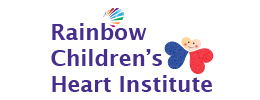From spotting early signs to getting your child treated, here’s everything you need to know about congenital heart problems
Congenital heart defects, or heart defects present at birth, affect 8-9% of newborn babies, in varying degrees of seriousness. The good news is that heart defects can usually be addressed through medical or surgical means, and almost all affected children go on to lead full and enriching lives.
Symptoms of heart defects
In some children, heart defects present no symptoms and parents usually remain unaware of their child’s heart problems. Symptoms generally manifest within the first few weeks of a child’s birth, and appear due to reduced oxygen levels in the body. They include:
• Blue-tinged lips and skin
• Challenges with feeding, including unexplained sweating
• Breathlessness
• Slow growth
• Poor skin pallor
• Exhaustion and lethargy
Causes of heart defects
Heart defects may be due to malformations in the walls of the heart, or due to a problem in the valves. As a result, the pure and impure blood may run the risk of mixing, or the heart’s ability to pump may be impaired. In most cases, heart defects develop in utero and are a matter of chance. Experts still aren’t completely sure why they happen, although genetics and family history are known to play a role. In rare cases, childhood infections and illnesses may trigger a heart problem, although such instances are few and far between.
When to seek help from a specialist
If you observe symptoms in your child, consult your pediatrician to help you determine whether an underlying condition may be playing stimulus. In turn, you may be referred to a pediatric cardiologist who may conduct a chest x-ray, an ECG, an ultrasound, or a combination of the three, in order to ascertain the problem.
Treating heart defects in kids
At Rainbow, our children’s heart hospital in Hyderabad has treatments for pediatric heart defects that are tailored in line with a child’s individual medical needs. Many heart defects do not require treatment, and correct themselves over time, while others may require a medical or surgical treatment plan. Your pediatric cardiologist will detail the interventions required for your child and only begin a treatment plan after taking you through a personalized treatment roster.
Living with a heart defect: implications and outcomes in kids
If you’re perpetually hounded by thoughts of extreme outcomes for your child, take heart. With successful treatment, heart defects can be corrected in childhood. Many children with heart problems are active and energetic, play sports, assert independence, and thrive through life. And while you may feel a natural inclination to keep your child safe from harm’s way, you may well be underestimating your child’s potential to be independent, social and on-the-go. It’s wise to ask your pediatric cardiologist about any activities that should be on your child’s no-go list. Also, it would be a good idea to sound your child’s school about their condition to keep them in the know if, God forbid, an extenuating medical circumstance arises.
Follow-ups after treatment
Regular check-ups can help keep your pediatric cardiologist up to speed on your child’s progress and help you gain confidence that your child is healthy and thriving. Some parents draw peace of mind from knowing that their child specialist is nearby, and finding a children’s cardiologist near you may give you a welcome psychological boost.
may give you a welcome psychological boost.
Taking heart in Rainbow Children’s Heart Institute
Rainbow Children’s Heart Institute is a center of excellence dedicated to pediatric cardiac treatments. Visit our children’s heart hospital in Hyderabad to learn more about how we can help you and your child.
Looking for a children’s heart hospital in Hyderabad? Click here to book an appointment with a children’s cardiologist near you.

